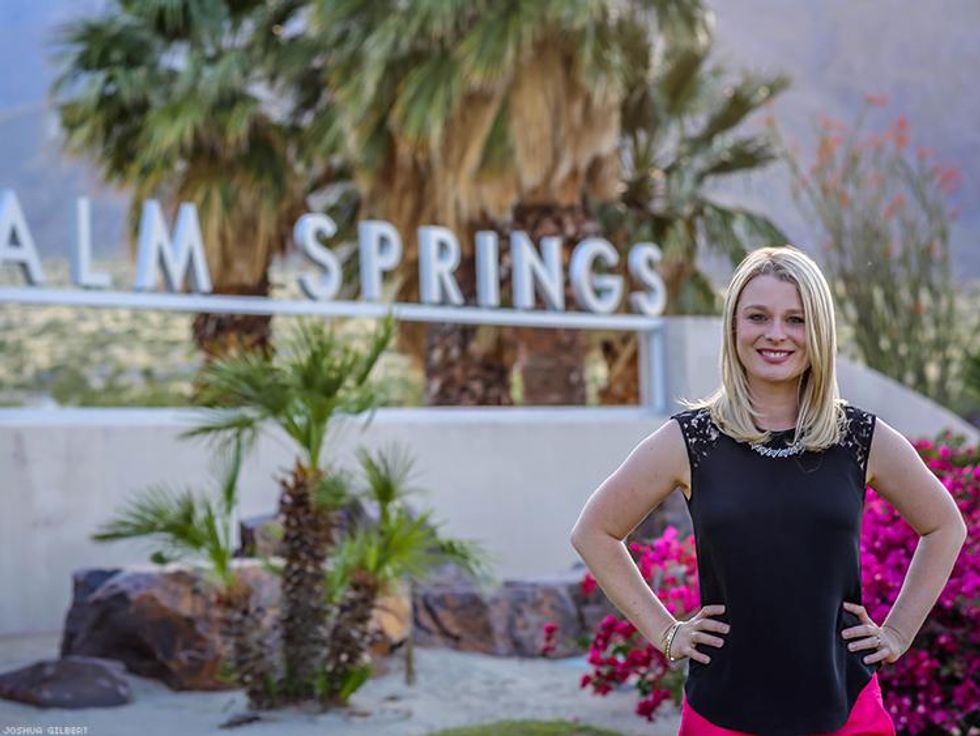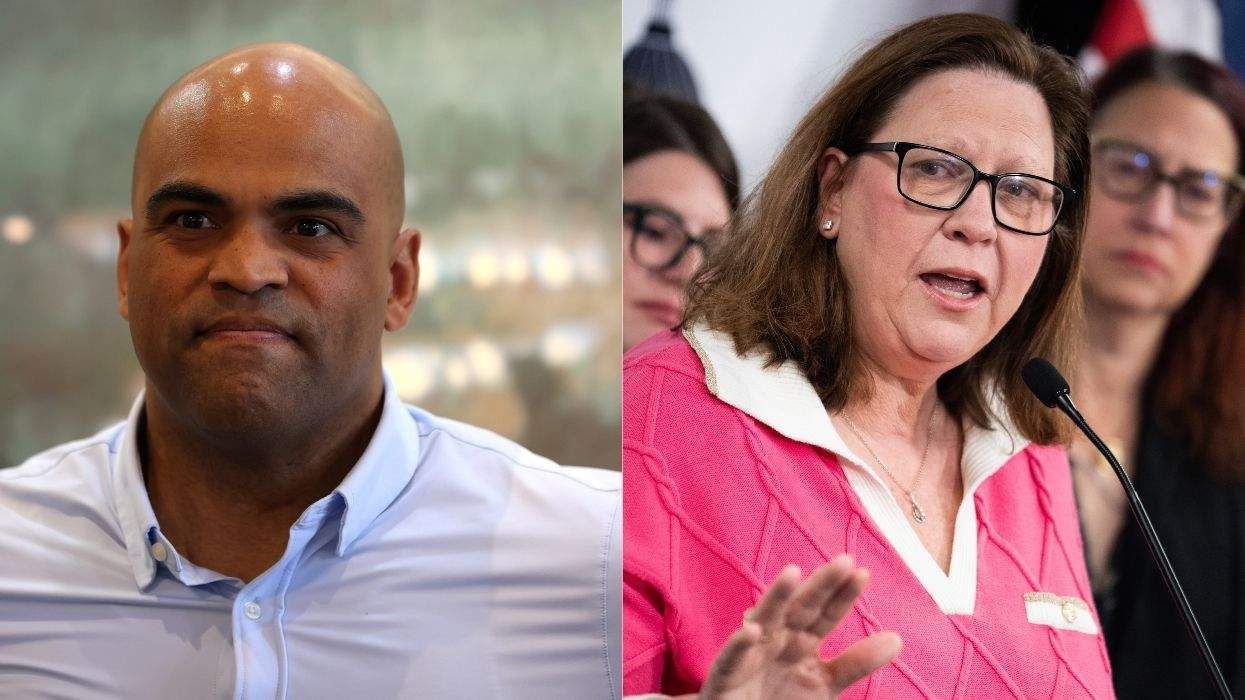The desert city of Palm Springs, Calif., about a 90-minute drive east of Los Angeles, is more than just an oasis packed with hotels and restaurants. Amid its impressive collection of mid-century homes and world-class amoeba-shaped swimming pools is a thriving queer community. The city's Arenas Road boasts a lively strip of LGBT businesses in an era when gay and lesbian bars are disappearing. Enduringly, Dinah Shore Weekend and the White Party, both held in Palm Springs, remain destination events for queer people from around the world.
(RELATED: Palm Springs City Council Now Entirely Queer)
Yet when Christy Gilbert Holstege, a 31-year-old attorney whose practice includes domestic violence and housing law, who happens to be bisexual and married to a man, ran for a seat on the Palm Springs City Council last year, she faced invasive scrutiny about her sexuality from some of the public and media.
"It's not appropriate to ask someone if they're really sure about their sexual orientation or if they'd had experiences or if it was just one time in college, which I heard again and again in professional settings," Holstege says. "I had male journalists asking me to 'prove it' -- my sexual history."
A graduate of Stanford Law who's long worked for social justice causes and who serves on the board of Planned Parenthood of the Pacific Southwest, Holstege ran on a platform of alleviating homelessness in her city and handily won a seat on the city council this past November along with Lisa Middleton, a transgender woman.
Holstege's and Middleton's elections to the Palm Springs City Council made headlines around the country with many national media outlets respectfully identifying the women. "An All LGBT City Council Takes Charge," was USA Today's headline, while the New York Daily News headline read "Palm Springs City Council Now Entirely Queer." But an opinion piece from Frank Bruni that ran in The New York Times about Palm Springs' all-queer City Council erased Holstege and Middleton in its headline that read "It's a Gay, Gay, Gay Government," although the body of the story acknowledged their identities.
"You know, Lisa and I, we brought the LBTQ to this and I think that's the important part of the story is that we have diversity. Because we had a majority gay male council for a while now," Holstege said, adding that despite encountering biphobia while she ran, the gay men on the city council have been completely supportive of her.
Like so many other women who dove into politics this past year, Holstege was spurred to action by Hillary Clinton's shocking loss to Donald Trump in the 2016 presidential election. On a Planned Parenthood of the Pacific Southwest board call the morning after the election, the 40 or so professional women on the call were distraught, some even sobbing over the unthinkable loss, Holstege recalled.
"We thought we lived in a world where a woman could become president and we were shocked to learn the fact that we don't [live in that world] and that someone so unqualified, especially in comparison, won," Holstege says. "So I was part of that, I believe, 13,000 women right after that election who came out and decided to run."
While the 2016 election was the catalyst for Holstege running for office, it wasn't the first time the thought occurred to her. A Sacramento native who took note of the inequality women and girls faced at a fairly young age, she had long had politics on her mind, and she attended law school with the belief that she'd one day run.
"I realized that really the best way to create change is often to run," says Holstege, who still works full-time as an attorney. "I saw an opportunity where I could create larger-scale change for my community by running for office."
Running as an out candidate hadn't been at the forefront of Holstege's thinking when she set out, especially considering that in progressive Palm Springs there were other issues, like homelessness and climate change, that seemed more pressing.
"It's a local election so we were really trying to keep it to the issues. I didn't think about it much," Holstege says. "In a place like Palm Springs we really have achieved a promised land in that orientation and identity don't matter as much."
That is, until they did matter. Holstege sought endorsements where she could, including from Victory Fund, a nonprofit that seeks to elect LGBT candidates. Squarely in the generation dubbed "millennials," Holstege has embraced expansive progressive ideas about sexuality and gender and chose to identify in conversations where her sexuality came up as part of the LGBTQ community in order to avoid binaries.
"I was really trying especially in LGBTQ spaces to say I identify as LGBTQ and this is who I am, and I'm married to a man but I identify as part of the community," Holstege says. "I really think that tracks with how millennials identify."
During the race, despite her record of social justice work, Holstege found herself defending her right to identify as someone within the community even as she was grilled about the veracity of her being bisexual, an exhausting but not uncommon occurrence. But Holstege stood up to the biphobia.
"How much do we make people prove it? How much of a burden do we put on people to share their stories?" Holstege says, adding that she stood up to the questioning. "I gave some pushback because I said, 'I'm already running as the first millennial, the youngest person on city council by decades, and I'm a sexual assault survivor...'"
The biphobia Holstege faced during her campaign is common enough that advocacy groups like Still Bisexual have formed to empower bisexual people as well as to educate others on how bisexuality works.
"Whether in a committed relationship or not, your sexual orientation is an identity that doesn't get washed away by the gender of your partner," Still Bisexual founder Nicole Kristal tells The Advocate. "Married monogamous straight people are still straight. And married monogamous gay people are still gay -- just because they haven't slept with someone else since getting married, it doesn't erase their orientation and their identity. It's ridiculous that married monogamous bisexuals still have to explain this."
The kicker though is that Holstege found herself most often explaining her sexuality to members of the queer community.
"My straight friends didn't bat an eye when I said, 'I'm bi. I'm attracted to people of all genders.' But then, when I'm going to our local LGBTQ Democratic club, I'm getting grilled about my sex life and sexual history in endorsement interviews," Holstege says. "So that was really challenging -- the bi-erasure and invisibility which is so prevalent in our community."
With an eye to the future and an awareness of queer history, Holstege says she engaged in conversations with her Baby Boomer friends who had difficulty understanding that Holstege wanted to focus primarily on the fact that she's a champion for social justice and progress rather than on the details of her sexual history.
"I was trying to make it more about my history and track record of really getting things done regardless of, you know, who I've slept with," Holstege says. "But my older friends had a hard time in part because their entire adulthoods were struggling with being marginalized because of who they slept with."
Although Holstege faced biphobia and erasure from some people under the LGBTQ umbrella, she's proud of Palm Springs, which she calls a "safe haven" and a "beacon of hope" where many LGBTQ voters have found acceptance.
There is much to be gleaned from Holstege's campaign and win, and even more from her deference for the past and hope for the future.
"It's important to know where each generation is coming from but also to allow us the space as millennials to carry on the work of the movement and know that it will have a more expansive approach and more inclusive approach than what's come before," Holstege says. "We need the space to do that as well as we give respect for the people who've come before us in a movement."
Photo credit: Joshua Gilbert

















Charlie Kirk DID say stoning gay people was the 'perfect law' — and these other heinous quotes
These are some of his worst comments about LGBTQ+ people made by Charlie Kirk.